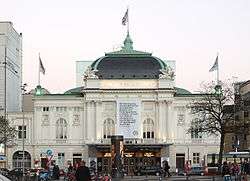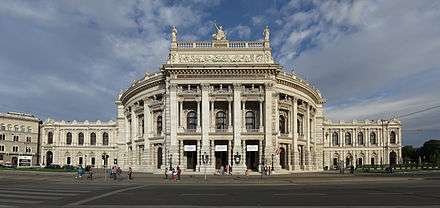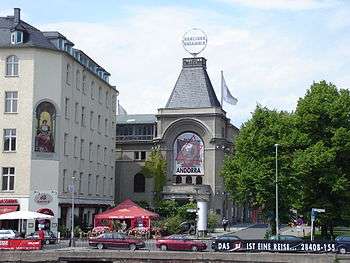Peter Zadek
| Peter Zadek | |
|---|---|
| Born |
19 May 1926 Berlin, Germany |
| Died |
30 July 2009 (aged 83) Hamburg, Germany |
| Spouse(s) | Brigitta Blumenthal |




Peter Zadek (German: [ˈtsaːdɛk]; 19 May 1926 – 30 July 2009) was a German director of theatre, opera and film, a translator and a screenwriter. He is regarded as one of the greatest directors in German-speaking theater.
Biography
Peter Zadek was born on 19 May 1926[1][2][3] to a Jewish family in Berlin. In 1934, he emigrated with his family to London where he later studied at Old Vic theatre, after a year at Oxford University.[4] He began in weekly rep in Swansea and Pontypridd. He studied at the Old Vic, and his first productions included Oscar Wilde’s Salome and T. S. Eliot’s Sweeney Agonistes. Zadek caused a stir in London in the late 1950s with his productions of works by Jean Genet. Indeed, Genet was so outraged by Zadek's world première of The Balcony at the Arts in 1957 that he apparently bought a gun with the intention of shooting his director.[4] He also worked as a director for the BBC in this period.
Bremen years
Returning to Germany in 1958, Zadek worked in the theatre in Bremen from 1962 to 1968. In 1969, he directed the film I'm an Elephant, Madame. It was entered into the 19th Berlin International Film Festival, where it won a Silver Bear award.[5]
Shakespeare as passion
Zadek and his partner Elisabeth Plessen, have translated many of Shakespeare's works into German for the theater as well as works of Pinter and Chekhov, among others. Zadek was renowned for productions of Shakespeare's plays and for sparking a greater interest in English drama among German audiences. Almost three years, as the German critic and connoisseur of theater history, after his arrival in Germany was Zadek in to the German scene. 14 stagings in three years and four in the following six months: „Zadek was in a rush of making“ (im Rausch des Machens), and his „Theatermut“ (theater-courage) rejected the literary Shakespeare and took his absurdly grotesque side out. [6] So Zadek's acclaimed staging of Der Kaufmann von Venedig (The Merchant of Venice) at Burgtheater in 1988 f. e. moved the story from the bankrupt businessman and the deadly pledge for the saving credit wisely and harmoniously into the modern every daylife.[7]
Illness and dead
Despite suffering from an illness, Zadek continued working in his later years. In 2008, he staged Pirandello's Naked at the St. Pauli Theater in Hamburg. Zadek's last production was Shaw's Major Barbara, performed at the Schauspielhaus Zurich in February 2009. He died in 30 July 2009 in Hamburg,[8] survived by his two children, Simon Zadek and Michele Zadek-Ewing.
Head of theaters
He headed up such major German theaters as the Schauspielhaus Bochum, where he coined deeply the so-called Zadek-Era until today.[9] from 1972 to 1979. Here he paved the career of two German artists, first Herbert Grönemeyer, today one of the most popular Singer-songwriter’s, who was his musical director then (1976) and also an actor in roles, such as the Till Eulenspiegel or Melchior in Frank Wedekind’s Frühlings Erwachen,[10] and secondly the German Natias Neutert, who performed his One-Mensch-Theater.[11]
In 1984, Zadek worked at the Freie Volksbühne Berlin and got a great success with Josua Sobol’s playwright Ghetto with his discovery of the actor Ulrich Tukur (who later became staff actor within the ensemble of Deutsches Schauspielhaus) 1985–1989 at Deutsches Schauspielhaus, Hamburg. From 1992 to 1996 Zadek was appointed as one head among others at the Berliner Ensemble, the theater founded by Bertolt Brecht.[12] After German reunification the Senate of Berlin appointed a "collective" of five stage directors to serve as Intendanten (General Administrators): Peter Zadek, Peter Palitzsch (1918–2004),[13] Heiner Müller, Fritz Marquardt and Matthias Langhoff. In this former East German theater Zadek was a director who represented the West. Indeed, he brought with him an international team that formed a "Western invasion" which revived the Berliner Ensemble. In addition to bringing great actors such as Gert Voss and Eva Mattes, Zadek brought in young protégé stage directors such as British director Rosee Riggs and also appointed renowned American Berlin-based conductor Alexander Frey as Music Director of the theater. Frey was the first American to hold any position at the Berliner Ensemble, as well as being the theatre’s first non-German Music Director; his historic predecessors include the composers Kurt Weill, Hanns Eisler, and Paul Dessau —all of them worked under Brecht.[14][15]
Opera director
Zadek directed his first opera, Mozart’s The Marriage of Figaro, in 1983. He also directed Kurt Weill's opera, Aufstieg und Fall der Stadt Mahagonny (Rise and Fall of the City of Mahagonny) at the Salzburg Festival in 1998.[16][17]
Acting
Zadek acted in a small role in Rainer Werner Fassbinder's film Die Sehnsucht der Veronika Voss (Veronika Voss, 1982).[18]
Awards


Beside of the fact, being chosen as "Director of the year" numerous times by the German Theater heute magazine, he got following awards:
- 1969 Silver Bear Award for the film I'm an Elephant, Madame at the 19th Berlin International Film Festival
- 1988 Kortner Award
- 1989 Piscator Award and Kainz Award
- 1991 Member of German Academy of the Arts
- 1992 Commandeur des Arts et des Lettres
- 1994 Critics' Prize of the Edinburgh International Festival (for his brilliant direction of Anthony and Cleopatra combined World War I England and ancient Egypt)
- 2000 Nestroy Award
- 2002 German Federal Cross of Merit,
- Europe Theatre Prize[19]
Legacy
Following Zadek's death, Brtitish critic Michael Billington wrote in The Guardian:
"Zadek was mercurial, intuitive, even populist in his approach – and the results were sometimes astonishing. Four of his shows came to the Edinburgh International festival and he always made you re-assess a play. I recall a modern-dress Merchant of Venice in which Gert Voss's assimilated Shylock, even after his humiliation in the trial scene, coolly strolled off stage as if preparing to phone his broker. In 2004, Zadek also brought us a brilliantly witty, ironic Peer Gynt: one that suggested Ibsen anticipated Strindbergian dream-drama, Brechtian expressionism, the madhouse world of the Marat/Sade and even modern physical theatre."[20]
Billington also wrote in the same article:
"Although Zadek made his name in Germany, he never forgot his British roots. When I went to see his Berlin production of Pinter's Moonlight, he told me that he loved Pinter's work because of its origins in weekly rep and because, as he said, "it was like a combination of Agatha Christie and Kafka". But Zadek also understood Pinter's play profoundly: rarely have I seen Pinter's idea that women possess an emotional awareness denied to men so vividly expressed."[20]
In 1999 in Vienna, when he directed Hamlet with a woman in the title role, the Austrian newspaper Wiener Zeitung criticized him having to much of a "children belief in justice"[21] (Kinderglaube an Gerechtigkeit). In 2015, the city of Bochum designated a newly built street close to the Schauspielhaus Bochum as Peter-Zadek-Str. [22][23]
References
- ↑ "Zadek Peter". WIEM Encyclopedia (in Polish). Retrieved 2007-06-08.
- ↑ "Zadek Peter". Internetowa encyklopedia PWN (in Polish). Retrieved 2007-06-08.
- ↑ "Peter Zadek". Centre for Translation and Textual Studies. Archived from the original on September 26, 2006. Retrieved 2007-06-09.
- 1 2 Hugh Rorrison "Peter Zadek", The Guardian, 3 August 2009
- ↑ "Berlinale 1969: Prize Winners". berlinale.de. Retrieved 2010-03-06.
- ↑ Cf. the chapter Zadeks Rausch in Günther Rühle: Theater in Deutschland 1945-1966. Seine Ereignisse — seine Menschen. S. Fischer Verlag, München 2014. ISBN 9783100014610
- ↑ Cf. Urs Jenny: Die ganze Welt ist eine Börse in: Der Spiegel 51/1988 http://www.spiegel.de/spiegel/print/d-13531895.html
- ↑
- ↑ http://www.spiegel.de/spiegel/print/d-42853917.html
- ↑ "Über Schröder kann man nicht singen". Zeit-Online. Retrieved 23 February 2009.
- ↑ Cf. Neutert unterwegs in: Die Zeit, No. 32. 04 August 1978.
- ↑ Cf. Rolf Michaelis: Mords-Musical in: Die Zeit 20. July 1984
- ↑ Hugh Rorrison Obituary: Peter Palitzsch, The Guardian, 28 December 2004
- ↑ Cf. Manfred Wekwerth: Erinnern ist Leben. Eine dramatische Autobiografie. (Originally 2000), Verlag neues leben, Berlin 2015. eBook ISBN 978-3-355-50016-6, print ISBN 978-3-355-01827-2
- ↑ Cf. Matthias Tischer: Komponieren für und wider den Staat. Paul Dessau in der DDR. KlangZeiten — Musik, Politik und Gesellschaft, Böhlau Verlag, Köln/Weimar 2009. ISBN 978-3-412-20459-4
- ↑ Der Spiegel 31/1998 http://www.spiegel.de/spiegel/print/d-7941499.html
- ↑ https://www.youtube.com/watch?v=1y32fnVZx2Y
- ↑ http://www.imdb.com/title/tt0084654/
- ↑ XI Europe Theatre Prize / Reasons Europe Theatre Prize
- 1 2 Michael Billington "Peter Zadek's death is a loss to all European theatre", The Guardian (blog entry), 3 August 2009
- ↑ Cf. Hilde-Haider-Pregler: Kinderglaube an Gerechtigkeitin: Wiener Zeitung 25. 05. 1999 http://www.wienerzeitung.at/nachrichten/kultur/buehne/368505_Vom-Kinderglauben-an-Gerechtigkeit.html
- ↑ Cf. Frankfurter Allgemeine Zeitung, 09.14.2015.
- ↑ https://www.bochum.de/C12571A3001D56CE/vwContentByKey/W2A4DCU9470BOCMDE/$FILE/2015_peter_zadek_strasse.pdf

